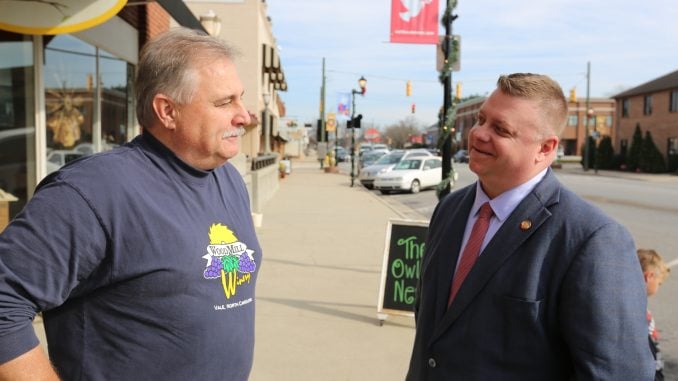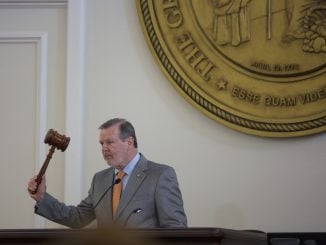
LINCOLNTON — In politics, timing is everything. For Rep. Jason Saine of Lincoln County, timing has played a major role in his rise in the N.C. House of Representatives, his placement on an influential Federal Communications Commission (FCC) committee, and his recent appointment as chairman of the American Legislative Exchange Council (ALEC).
Saine came to the N.C. House in 2011 after being appointed to the unexpired term of Johnathan Rhyne, who had resigned his seat. Just as he settled into his new position in Raleigh, he attended the States and Nation Policy Summit sponsored by ALEC. At this first meeting, Saine said he was approached by others in the N.C. delegation to become the state’s ALEC chair, which had been recently vacated by Rep. Fred Steen when the legislator left to run for Congress.
“I was enamored with the organization due to (economist) Art Laffer’s involvement,” said Saine. He agreed to take over the role and has served as state chair since.
ALEC is a national organization whose membership is made up exclusively of state legislators. While the group is open to all who meet the single criteria, the group’s commitment to “limited government, free markets and federalism” make it a decidedly conservative-leaning group. While most members of the N.C. General Assembly are not members of ALEC, the current delegation to ALEC of about 40 members is made of powerful House members, including Speaker of the House Tim Moore (R-Cleveland), Speaker Pro Tem Sarah Stevens (R-Surry) and Budget Committee Chair Justin Burr (R-Stanly).
Rep. Saine said his involvement in ALEC has been primarily related to technology and communications.
“It’s a good place to get new ideas,” he said, adding that “ALEC is really focused on the exchange of sound policies with national discussions.”
Saine took on his first leadership role within ALEC when he became co-chair of the Communications and Technology Task Force, a national group comprised of almost 200 members. As he established himself on the task force, another opportunity arose when then-Speaker Thom Tillis resigned his seat on the ALEC Board of Directors to join the U.S. Senate. Saine replaced Tillis on the national board of ALEC at the end of 2014.
Saine’s membership in ALEC and his communications expertise from the task force set up another well-timed opportunity. A colleague on the task force was retiring from the FCC intergovernmental advisory council and asked Saine if he would be interested. Saine accepted and is now one of three state-level legislators serving on the 15-member FCC group.
“Cable and broadband access, along with public safety communications, are areas where my work at ALEC and with the FCC dovetail nicely,” said Saine. “We can learn from the successes and failures in other states, so we are ahead of the game in developing policies that best fit our state and our constituents.”
Saine is looking forward to a year at the helm of one of the nation’s largest and most influential policy groups. He is only the second N.C. legislator to lead ALEC — the other was former Speaker Harold Brubaker — and is the fourth legislator to lead a national group. In addition to Brubaker at ALEC, former state congressman and now N.C. Sen. Daniel T. Blue Jr. and former Speaker Joe Hackney who both lead the National Conference of State Legislatures. According to Saine, the policy goals in 2018 for ALEC will hit on all of the major policy tenets of the organization.
“Coming from the Communications and Technology Task Force, technology will be a big part of my tenure,” said Saine. “It’s not lost on my colleagues at ALEC — I’m a tech geek — that technology will be a big focus.”
At the same time, Saine said fiscal policy will be an overarching point that connects with technology. For 2018, Saine said that continued tax reform across the country, expansion of broadband access, improvements in wireless broadband — including 5G wireless — criminal justice reform and free speech issues will dominate the agenda of ALEC and state legislatures.



